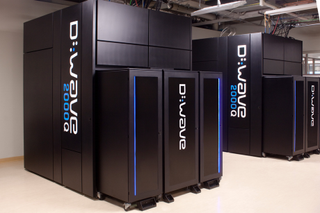Google, NASA Upgrade To The New D-Wave 2000Q Quantum Annealing Computer

D-Wave announced that Google, NASA, and the Universities Space Research Association (USRA) have upgraded their 1,000-qubit D-Wave 2X quantum annealing computer to the latest 2,000-qubit D-Wave 2000Q. The new computer is supposed to be up to 1,000 times faster than the last generation for certain optimization problems.
Google And NASA Collaboration
Back in 2013, Google, NASA, and USRA announced a joint research lab called the Quantum Artificial Intelligence Laboratory (QuAIL). The three organizations would use D-Wave’s latest quantum annealing computer at the time (the 512-qubit D-Wave Two) to “assess the potential of quantum computers to perform calculations that are difficult or impossible using conventional supercomputers.”
In 2015, QuAIL upgraded to the 1,000-qubit D-Wave 2x, which Google showed to be up to 100 million times faster than a single-core CPU for simulated annealing problems that contained almost 1,000 variables.
Simulated annealing is a probabilistic technique that can approximate the optimum solution for a problem that contains many variables. For instance, it could solve the “traveling salesman” problem, where a salesman may be given hundreds or thousands of locations to visit on a map, and he or she would need to approximate the most efficient travel route.
Simulated annealing can be done on regular PCs as well, but the more variables a problem has, the more difficult it is to solve. Quantum computers promise to significantly reduce the time it takes to solve such problems.
D-Wave 2000Q
D-Wave recently started to ship the D-Wave 2000Q, and it announced the new device's first customer as well: Temporal Defense Systems, a software security company that planned to use the quantum annealing computer to improve its products.
Google, NASA, and the USRA are now buying the latest generation D-Wave quantum computer, as well, to further explore its potential. The new D-Wave 2000Q is not just up to 1,000 times faster than the previous generation, but it also has better controls, allowing QuAIL to tweak it for its algorithms. QuAIL is now looking at developing machine learning algorithms that can take advantage of D-Wave’s latest quantum annealing computer.
Stay On the Cutting Edge: Get the Tom's Hardware Newsletter
Get Tom's Hardware's best news and in-depth reviews, straight to your inbox.
“Through USRA, the broader research community can get access to D-Wave’s state-of-the-art quantum computer, and collaborate with scientists at NASA, Google, and other universities,” said David Bell, Director, USRA’s Research Institute for Advanced Computer Science. “Since the installation of the first D-Wave system in 2013, researchers from around the world have been able to conduct cutting-edge research using technology unavailable elsewhere,” he noted.
Virginia Tech Quantum Computing Research Center
D-Wave also announced that it will help the Virginia Polytechnic Institute and State University (Virginia Tech) establish a quantum computing research center for defense and intelligence purposes. D-Wave’s role will be to aid the Virginia Tech staff in developing applications and software tools for its quantum annealing computers.
“Establishing a quantum computing center at the Hume Center will advance our mission of supporting national security, and provide access to technology that few researchers can leverage today,” said Mark Goodwin, deputy director and COO of the Hume Center. “Working closely with D-Wave supports that goal in a meaningful, immediate way," he added.
Because D-Wave is not a universal quantum computer, like what Google and IBM plan to build over the next few years, it is not expected to be useful in cracking encryption. Virginia Tech plans to also focus on developing machine learning algorithms for the D-Wave computers.
-
CaedenV @Toms hardwareReply
I have been reading your articles since I was in college in ~2002-03. You guys have been a great source of information for several years. However, I have been increasingly annoyed at your site over the years. After over 10 years of complaints you still can't manage to get full res click-through images on articles. Your recent pic collection/carousel has UI that covers the images, which is just amateur hour. The site still does not scale to a normal window width leaving a skinny column of info in a sea of advertisements. And most recently you have added these auto-playing videos.
I can't take it any more, and am removing your site from my feeds.
I really love the history of your site, and I look forward to the day you catch on to simple modern web design that can retain web traffic. Your writers do a good job; it is about time your web team stepped up to the plate a little and supported them. -
FunSurfer Ooooh... Quantum computers are on the rise... Intel is buying chip companies and AI software for billions... seems that Skynet is arround the corner...Reply
Most Popular



